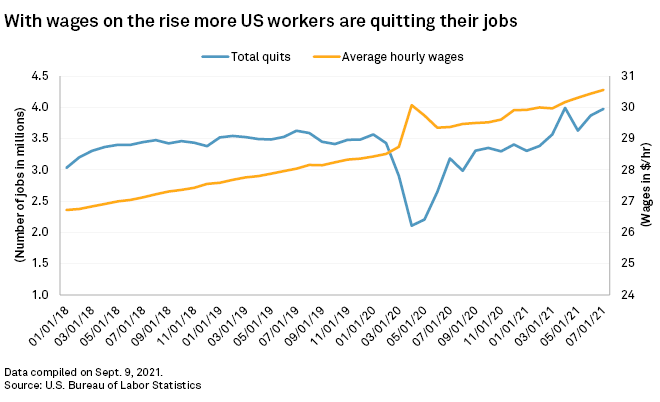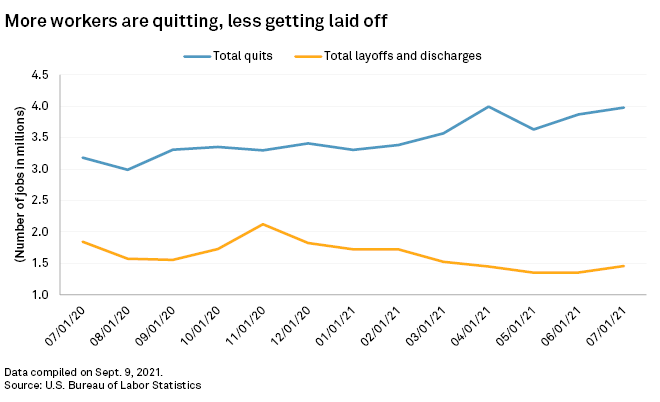Americans are quitting their jobs at near-record numbers for higher pay and better working conditions, new data indicates.
In July, nearly 3.98 million workers quit their jobs, up 25% from the 3.18 million who quit in July 2020 and up about 90% from the 2.1 million who quit in April 2020, at the height of the pandemic, according to the latest U.S. Bureau of Labor Statistics data. The figure is just behind the all-time high of 3.99 million resignations in April 2021.

"It essentially suggests that workers are very confident in their ability to find a better job," said Lydia Boussour, senior U.S. economist at Oxford Economics, in an interview. "Better could mean higher compensation, but also better benefits or more flexible working arrangements."
The sectors seeing the highest number of workers quitting in July were accommodation and food services with 710,000 quits up from 480,000 in July 2020, professional and business services with 684,000 quits from 572,000 a year earlier, and retail, where 678,000 workers quit, compared to 524,000 in July 2020.
The historically high rates of quitting come as U.S. companies faced a record 10.9 million open jobs in July, according to government data released Sept. 8. The number of job openings in July was 2.2 million over the roughly 8.7 million unemployed Americans that month, the data shows.
The unemployment rate remains above pre-pandemic levels as childcare hurdles, health concerns, and expanded unemployment benefits have kept out-of-work Americans from racing to fill open positions.
"Workers continue to take advantage of record staffing demand to improve their employment situation, whether that be switching jobs for higher pay, more flexibility or a career change," Sarah House, a senior economist at Wells Fargo Securities, wrote in a Sept. 8 note.
American workers, it seems, gained some bargaining power during the pandemic as companies increase incentives to attract new employees.
The average reservation wage, which is the lowest wage a worker would be willing to accept for a new job, increased to a record $68,954 in July. That is up 7.4% from July 2020 when the average reservation wage was $64,226, according to the Federal Reserve Bank of New York's labor market survey, released Sept. 7.

In addition, companies are laying off far fewer employees, with less than 1.5 million workers laid off or discharged in July, well below the record of 13 million in March 2020 at the height of the pandemic, and down from the more than 1.8 million U.S. workers laid off in July 2019.
A recent 451 Research survey of 605 companies found that 56% of those businesses were having a difficult time rehiring employees laid off due to the pandemic.
Companies are no longer focused on boosting pay to attract workers to open positions, but also raising pay to keep current staff from leaving for better-paying jobs, said James Knightley, chief international economist with ING, in a Sept. 8 note.
"In turn, this means the competition for staff is likely to keep wages and benefits under upward pressure, which in turn should mean broader inflation risks remain somewhat elevated," Knightley wrote.
451 Research is a part of S&P Global Market Intelligence.



